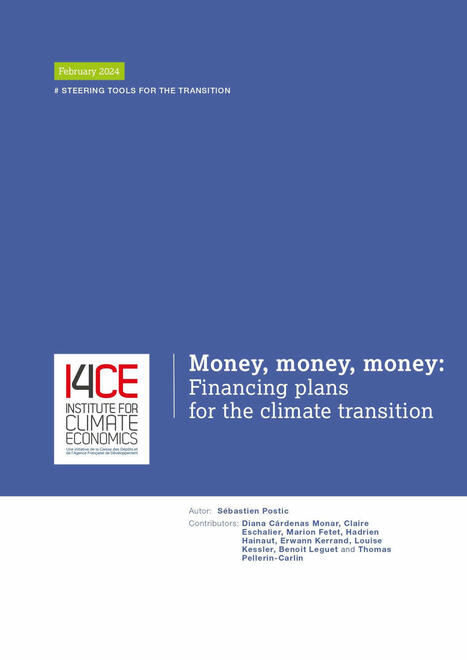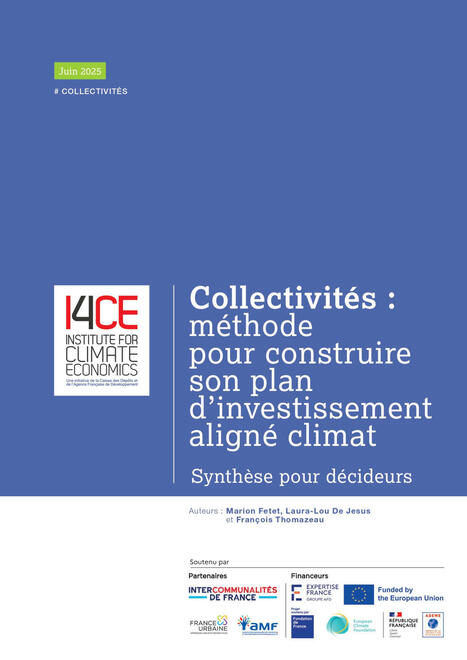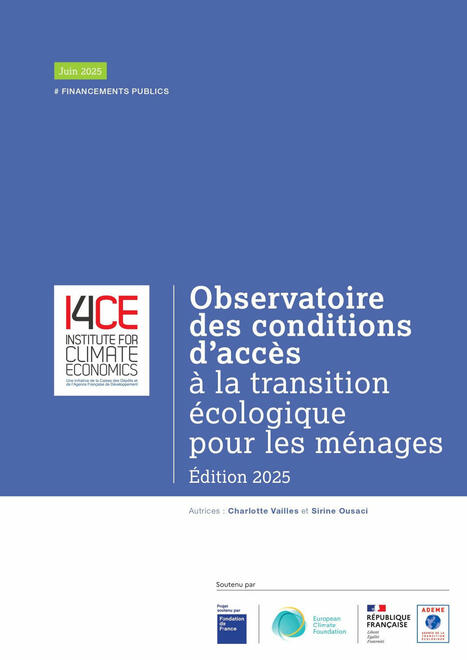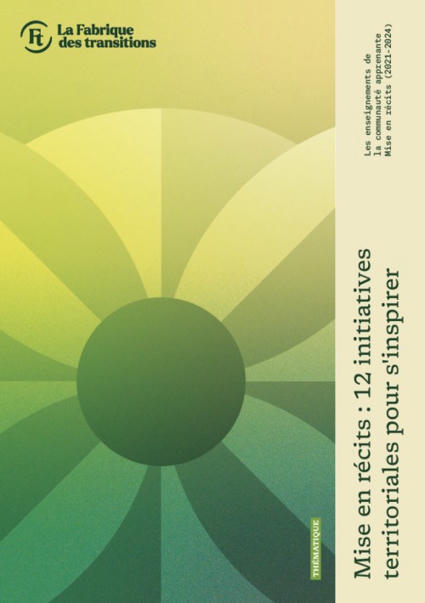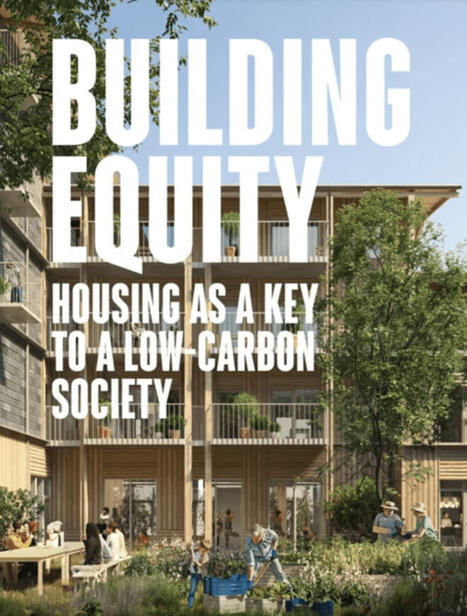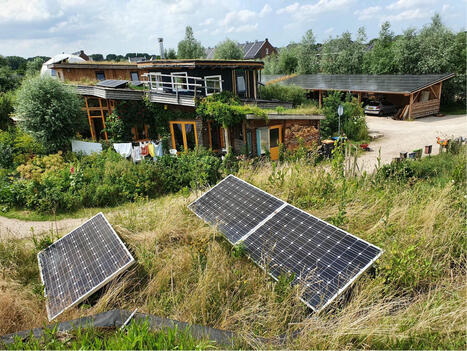 Your new post is loading...

|
Scooped by
Energy Cities
Today, 5:00 AM
|
Cette étude révèle un fort attachement des Français aux enjeux écologiques, quel que soit leur lieu de vie. Des majorités claires se dégagent en faveur de politiques environnementales ambitieuses. Toutefois, ce consensus de principe se heurte à de fortes disparités territoriales dès lors qu’il s’agit de leur mise en oeuvre concrète. Dans les zones rurales et les petites villes, les politiques écologiques sont souvent perçues comme injustes, inadaptées ou trop coûteuses individuellement. À l’inverse, les grandes métropoles, mieux équipées et accompagnées, affichent une adhésion plus marquée, y compris lorsqu’un effort personnel est requis.

|
Scooped by
Energy Cities
June 26, 1:34 AM
|
Our food system uses 40% of petrochemicals and 15% of fossil fuels – yet it's left out of the climate conversation. Here's the path to fossil-free food.

|
Scooped by
Energy Cities
June 19, 7:34 AM
|
Europe is warming up faster than any other continent and the most vulnerable people are bearing the brunt of climate impacts. A new report from the European Environment Agency (EEA), published today, shows that although the most vulnerable groups are disproportionately affected, they are often overlooked in climate adaptation planning and especially implementation.

|
Scooped by
Energy Cities
May 28, 8:24 AM
|
This policy brief identifies the energy transition’s potential to strengthen gender equality. Living up to this potential requires intentional policy. Using examples from France, the brief showcases that, while gender has entered the energy transition
policy discourse here and there, more needs to be done to avoid repeating inequalities of the past. Gender mainstreaming and equal participation of all genders across demand, supply and decision-making spaces within the transition is critical and EU policymakers can lead the way

|
Scooped by
Energy Cities
May 14, 10:45 AM
|
All of humanity is facing unprecedented uncertainty due to climate change, political turbulence, and the rise of artificial intelligence (AI). Stockholm Resilience Centre’s new annual report shows how this risk landscape is connected and can be addressed.

|
Scooped by
Energy Cities
May 7, 5:05 AM
|
This Playbook was developed as a collaboration between UNDP, TIAL and Demos Helsinki. It is a living resource that can help teams have a conversation about strategy and tactics for renewing existing or designing new institutions. We developed this for Istanbul Innovation Days 2025. You can find a flip-book version of it here. Why do we […]

|
Scooped by
Energy Cities
April 24, 5:57 AM
|
The transition of Europe’s building stock is not just an environmental necessity, but also a social and an economic imperative. Our research in Denmark and Poland shows that delivering homes that are both affordable and sustainable is feasible. The EU, governments and public banks have the opportunity to turn this momentum into a real solution for the housing crisis.

|
Scooped by
Energy Cities
March 21, 4:14 AM
|
What if energy could be reclaimed as a global public good, free from profit-driven systems and rooted in justice? The Reclaiming Energy report offers systemic solutions to the climate crisis, advocating decolonial, democratic governance and transformative public–community partnerships. By redefining energy and resource justice, it charts a clear path toward a just, sustainable, and democratic future.

|
Scooped by
Energy Cities
February 26, 4:59 AM
|
PesticidesSustainable FoodEU FoodBiodiversity Soil Atlas The Soil Atlas 2024 not only highlights the consequences of the global loss of fertile soil, but also shows the potential of sustainable and fair land use for climate protection and biodiversity.

|
Scooped by
Energy Cities
February 14, 5:02 AM
|
France should publish mid-year its first multi-annual strategy for financing the ecological transition. This is a long way from the first 2015 climate strategy, which barely touched funding aspects. And it is good news. We at I4CE believe that such plans are essential tools to support the transition to low-emission, climate-resilient economies. Credible, multi-year public spending targets help to embark the private sector and the funders of public action (debt holders, international donors) in the transition, and redirect financial flows as demanded by the Paris Agreement. Comprehensive financing plans also avoid simplistic approaches based on case-by-case project appraisal on the basis of limited cost-benefit considerations, which can ultimately result in significant additional costs.

|
Scooped by
Energy Cities
February 7, 3:39 AM
|
In an era of escalating geopolitical and ecological crises, sufficiency offers a pathway to a more balanced and harmonious existence, enriched by the moral clarity provided by philosophers. Sufficiency is deeply rooted in philosophy. Harry Frankfurt's essay "Equality as a Moral Ideal" (external link) provides a compelling lens through which to view sufficiency. Frankfurt argues that economic equality is not of paramount moral importance. Instead, what truly matters is that everyone has enough to lead a decent life.

|
Scooped by
Energy Cities
January 31, 8:58 AM
|
The Language of Climate Politics: Fossil-fuel propaganda and how to fight it Dr. Genevieve Guenther. Oxford: Oxford University Press, 2024, 280 pages. $29.

|
Scooped by
Energy Cities
January 31, 5:29 AM
|
Covid-19 was a canary in a mine. It exposed the vulnerabilities of 21st-century food systems but did not create them. Since then, the world has faced a “polycrisis:” a cluster of weather-related crop failures, war-induced food and energy shortages, and import dilemmas with compounding effects. Going forward, we need to plan for more sustainable and resilient food systems that improve environmental outcomes and address economic disparities. But food systems planning is a relatively new d
|

|
Scooped by
Energy Cities
June 27, 3:59 AM
|
La méthode PPI aligné climat s’adresse aux collectivités qui souhaitent intégrer leurs objectifs climat dans leur planification d’investissement. Elle permet de construire un plan d’investissement compatible, à la fois avec l’ambition climatique et la soutenabilité financière de la collectivité. Pendant plus d’un an, I4CE a travaillé avec plusieurs collectivités et experts afin de proposer une méthode adaptée aux réalités du terrain et robuste. Les résultats de ce travail sont gratuits et accessibles à tous.

|
Scooped by
Energy Cities
June 20, 4:34 AM
|
Dans l’édition de cette année, nous avons évalué les indicateurs de manière rétrospective - sur dix ans dans le cas de la rénovation et cinq pour la mobilité électrique-, afin d’identifier les facteurs qui ont amélioré – ou détérioré - l’accessibilité économique des solutions de transition sur les dernières années. Nous présentons ces indicateurs pour deux ménages types : la famille Deschamps et la famille Villeneuve, toutes deux dans les classes moyennes, propriétaires de leur logement et dépendantes de la voiture au quotidien sur qui repose la question de l'accessibilité de la transition.

|
Scooped by
Energy Cities
June 6, 6:01 AM
|
Radtke reviewed 129 studies focusing on participation processes in Germany, Austria, and Switzerland, and identified four levels of inclusion in participation. The most commonly occurring levels of participation are information (through media and public events, for example) and consultation (formats focused on dialog with various stakeholders).

|
Scooped by
Energy Cities
May 23, 8:40 AM
|
A fast transition to a fully renewable energy system hinges on meaningful community engagement and ensuring fair benefits from renewables for local host communities. Engaging with communities when developing wind and solar projects in their local vicinity is crucial. Engagement with local residents and relevant stakeholders needs to be early, accessible and continuous during the […]

|
Scooped by
Energy Cities
May 14, 10:42 AM
|
Rich Wilson, CEO of the democratic innovation centre Iswe, presents the newly launched UN Global Citizens' Assembly and what it could mean for global governance.

|
Scooped by
Energy Cities
April 29, 6:08 AM
|
This second piece is a Briefing Paper that explains how the UK economy actually functions. It draws on the works of many heterodox economists able to think and observe outside the ideological straight jacket of the mainstream.

|
Scooped by
Energy Cities
March 27, 11:56 AM
|
La politologue Fatima Ouassak invite l’écologie politique à se renouveler à partir des quartiers populaires, de l’histoire décoloniale et des religions. Entretien.

|
Scooped by
Energy Cities
March 20, 11:39 AM
|
Depuis 2021, la communauté apprenante « Mise en récits » réunit une centaine d'acteur·ices divers·es des transitions pour partager leurs expériences et tirer des enseignements communs. En 2023, la communauté apprenante « Territoires narratifs » est créée avec des binômes d'élu·es et d'agent·es de grandes collectivités françaises pour explorer plus spécifiquement les enjeux de l'approche narrative au sein des collectivités à partir de leurs expérimentations. Découvrez les enseignements de ces deux communautés apprenantes à travers deux publications, réalisées avec le soutien de l'ADEME

|
Scooped by
Energy Cities
February 20, 10:40 AM
|
Despite steady progress in key areas, the European Union is only partially on track to achieve the EU’s 2030 climate, environment and sustainability objectives, according to the latest monitoring report published by the European Environment Agency (EEA). More decisive measures are needed to boost a circular economy, reverse the declining trend in biodiversity and in reducing the EU’s consumption footprint.

|
Scooped by
Energy Cities
February 12, 11:21 AM
|
The release of the 10th edition of the Global Energy and Climate Outlook (GECO) is a good occasion to reflect
on the history of the GECO, and its importance for ambitious EU and global climate action.
The 2015 Paris Agreement compels nearly 200 countries to prepare, update and implement ambitious national
climate mitigation commitments. This includes the publication and implementation of Nationally Determined
Contributions (NDCs), in line with long-term low greenhouse gas emission development strategies (LT-LEDS).
NDCs and strategies must be consistent with the Paris Agreement mitigation goal of holding global average
temperature increase to well below 2°C above pre-industrial levels and pursuing efforts to limit the increase to
1.5°C. That is how the global community can jointly realise the Paris Agreement’s goals and keep our planet
liveable.

|
Scooped by
Energy Cities
February 6, 9:39 AM
|
This in-depth report examines how housing can serve as a lever for both environmental and social equity, focusing on the crucial intersection of affordable housing and decarbonization.

|
Scooped by
Energy Cities
January 31, 8:47 AM
|
The H2020 SERENE project has developed technical solutions for local energy areas by considering user engagement, local regulations, and cooperation with local authorities
The H2020 SERENE project (Sustainable and integrated energy systems in local communities) has focused on developing and demonstrating cost-effective and customer-centric solutions for the integration of different energy carriers in local energy areas. Technical and socio-economic benchmark models/roadmaps will be set up for replicability possibilities across Europe.
|

 Your new post is loading...
Your new post is loading...










